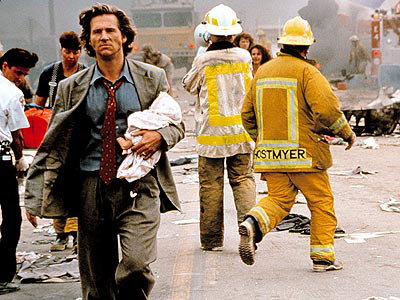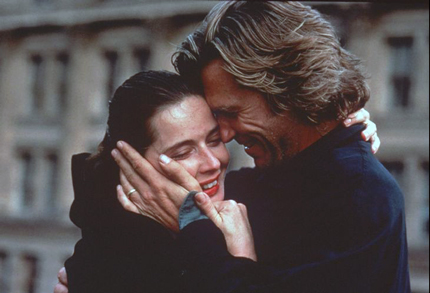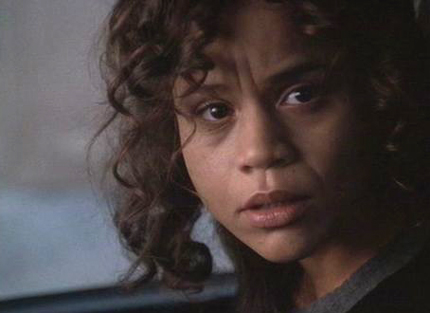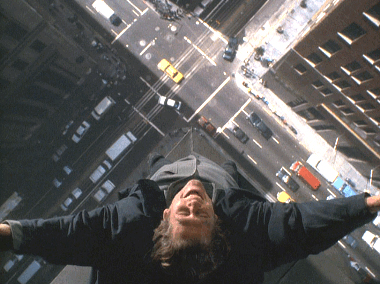Reviewed by Glenn Erickson
I haven't seen another movie as perceptive about the grim subject of airplane crashes as Peter Weir's Fearless, not even last year's rather good Denzel Washington movie Flight. Fearless is a tightrope walk all the way, with actors Jeff Bridges, Rosie Perez and Isabella Rossellini excelling in roles that on paper might read as unappetizingly morbid.

Once upon a time Australian Peter Weir was a contender for world-class sophistication in filmmaking, with his mysterious, ethereal shows The Cars that Ate Paris, Picnic at Hanging Rock, Gallipoli and especially The Last Wave. He made his share of commercial dogs in the 1980s but always came back with an honorable miss or a decent hit -- The Truman Show, Master and Commander. Fearless is a fairly small scale effort that works like a charm and seems to grow more powerful with the years. Thanks to those great performances, it seems even better now than when new.
San Francisco architect Max Klein (Jeff Bridges) is one of the lucky survivors of a commuter jet crash that claims the life of his business partner Jeff Gordon (John de Lancie). In the minutes before impact the normally skittish Max undergoes a radical personality change: attaining a weird sense of inner peace, he calmly helps his fellow survivors get clear before the wreck bursts into flame. But Max abruptly leaves the scene to be alone, returning home only after the police and the airline track him down a day later. Max feels disconnected with his previous life. His aloof attitude is a cause for alarm for his wife Laura (Isabella Rossellini). He flees the news media that proclaim him a hero. Max dodges the efforts of attorney Brillstein (Tom Hulce) to get him to lie to secure a larger payout for his business partner's widow, Nan (Deirdre O'Connell). He also rejects the efforts of the airline-appointed psychiatrist Bill Perlman (John Turturro) to assist him in his readjustment. Max can relate only to two fellow survivors, a boy who feels a reciprocal attachment and the forlorn Carla Rodrigo (Rosie Perez), who lost her baby son in the crash. Max is compelled to help Carla, and soon they're seeing so much of each other that his wife Laura begins to despair. Dr. Perlman discovers that Max now considers himself invulnerable, and is taking dangerous chances with his life, to reaffirm the post-crash elation of feeling really, truly alive. Max even eats strawberries, which have no ill effect. Before, he was so strongly allergic to them that eating just one could put his life in danger.

Fearless is a stunning suspense picture with a compelling spiritual dimension. Some of Peter Weir's previous heroes witness events that seem to prove the existence of a supernatural plane, and Max Klein's heightened state makes him feel as if he's the recipient of some kind of miracle. Mundane things no longer interest him. He's casually thoughtless and cruel to his beloved wife, and when confronted by frustrating reporters he comes close to losing control. Both the avaricious lawyer and the intrusive shrink at first make him upset. Max is experiencing what may be a very dangerous High.
The plane crash is presented mostly in flashback, in a beautiful way that neutralizes objections of sensationalism. Max is trapped with everyone else but suddenly feels an intense calm, an inner peace that he's able to communicate to his fellow passengers. Maurice Jarre's music has a lot to do with this almost sanctified atmosphere of impending doom, and Weir slips in a number of suggestive details. The light that shines from the window nearest to Max, his peaceful walk with the boy and the baby he has saved, and a slight wound under his arm all suggest images of Jesus Christ. He even takes a brief journey "into the wilderness."
Fearless stands out from Weir's other 'spacey' movies because it is not a genre fantasy or a stylized satire; it doesn't ask us to give credence to magic as in the eerie The Last Wave. Max's psychic transformation is easily pegged as a consequence of his extreme traumatic experience. But when will his exalted state of being cease, and what will happen when he comes down? He's lucky that nobody is fitting him for a strait-jacket.

As he tries to make peace with his new State of Consciousness, Max rejects the attempts of others to turn him into a god-like hero. Yet in his own hallucinated memories of the crash, Max sees himself as a savior spirit leading the lost passengers into the light, away from death. Jeff Bridges is marvelous as this spiritually energized super-being. He was great in a somewhat similar role in John Carpenter's Starman. Here our identification with him is complete -- we don't have to negotiate the terms of a fantasy to reach these characters.
Just as impressive is Rosie Perez, in a role most actresses would kill for. The Latin ball of emotion here channels her energy into a portrait of a wholly pitiable, self-torturing mother. Perez makes what might be a mawkish role into a magnet for our concern. Taking some bad last-minute advice in the plummeting jet, Rosie's Carla Rodrigo tries to hold her baby in her arms, a tragic mistake. A practicing Catholic, Carla beats herself up even more with guilt, and falls into a dangerous depression. Max tries to get through to Carla using their shared experience as a focus. Their special relationship is not really sexual, although the intimacy of their interaction confuses them and looks very bad to poor Laura suffering back home. Rosie Perez earned the film's only Oscar nomination, for Best Supporting Actress.
An essential honesty makes terrific human moments out of what most movies turn into dramatic hash. Mrs. Gordon's reaction to the confirmation of her husband's death is a beautiful acting moment by Dierdre O'Connell. The boy-survivor's attachment to Max carries no unhealthy connotations -- we know the kid will outgrow it. The patience of Isabella Rossellini's character eventually runs out, but screenwriter-original author Rafael Yglesias respects Laura too much to let her indulge in extreme behavior of her own. When she eventually demands that her erratic husband get his act together, we're on her side. Fearless is mature enough not to make choosing sides its business -- we're on everybody's side. Neither Tom Hulce's lawyer nor Rosie's opportunistic husband (Benecio Del Toro) are burdened with villain status.

The insightful Fearless resolves Max's potentially supernatural status and other more social-psychological matters in an extremely satisfying way. The movie creates a positive feeling about people. That's a rare thing in any decade, and almost unheard of today.
Key suspense moments involve a distraught Max perching dangerously on the edge of tall building and walking through fast moving traffic protected by faith alone. We can't give approval to Max's delusion that he's bulletproof, as it can only end up making him certifiably insane. He finally pulls an outrageous, reckless stunt that risks his and Carla's lives and might easily get him committed to an asylum. Yet the movie stays firmly on the rails of credibility. Rafael Yglesias comes off as a brilliant critic of human relationships, and Fearless ends up a very moving experience.
The Warner Archive Collection's Blu-ray of Fearless is a long-awaited gem. Back around 1999, Warners made Collectors unhappy by releasing a ragged pan-scanned DVD during a 'cheapie' marketing experiment. This HD disc is a real beauty. Cinematographer Allen Daviau (E.T.: The Extra-Terrestrial) is an accomplished visual stylist, and his taste serves director Weir's ideas well. Maurice Jarre's music score is one of his best of the 1990s. There are no extras, but English subtitles are provided. I hope that the Warner Archive continues and accelerates its Blu-ray program. 1

On a scale of Excellent, Good, Fair, and Poor,
Fearless Blu-ray rates:
Movie: Excellent
Video: Excellent
Sound: Excellent
Supplements: none
Deaf and Hearing Impaired Friendly?
YES; Subtitles: English
Packaging: Keep case
Reviewed: January 25, 2014
Footnote:
1. A note on the music from Correspondent Marco DuBose, 1.28.14:
Glenn, Thanks for the nice review of Fearless. I immediately took to the movie when it came out especially for Rosie Perez's performance. I really felt her pain. You called out Maurice Jarre's music which was great as usual. However, the movie made great use of Henryk Gorecki's Symphony #3 and as I recall, this is the music that plays during the crash scenes and helps create the "sanctified atmosphere of impending doom" you speak of. It has been awhile since I've seen the movie so my recollection could be off.
Written in 1976, Gorecki's Symphony #3 enjoyed great popularity in the '90s and Hollywood made use of it quite a bit. I'm not certain but I think Fearless was the first to use it. The timing makes sense since it was a 1992 record release that became a big bestseller. The "Symphony of Sorrowful Songs" fits in with the movie's themes. Here's a snippet from Wikipedia that sums it up well:
"A solo soprano sings a different Polish text in each of the three movements. The first is a 15th-century Polish lament of Mary, mother of Jesus, the second a message written on the wall of a Gestapo cell during World War II, and the third a Silesian folk song of a mother searching for her son killed by the Germans in the Silesian uprisings. The first and third movements are written from the perspective of a parent who has lost a child, and the second movement from that of a child separated from a parent. The dominant themes of the symphony are motherhood and separation through war."
Thanks, Marco
Return

Text © Copyright 2014 Glenn Erickson
See more exclusive reviews on the Savant Main Page.
Reviews on the Savant main site have additional credits information and are often updated and annotated with reader input and graphics.
T'was Ever Thus.
Return to Top of Page
|


